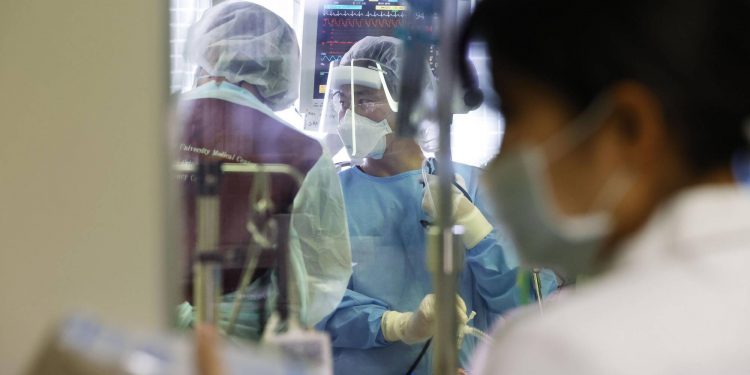A Japanese research team has detected antibodies that neutralized the virus that causes COVID-19 in 98 percent of people who had been sick with the disease in tests performed six months after they became infected.
The team, led by Yokohama City University professor Takeharu Yamanaka, said Wednesday it plans to conduct a follow-up survey to see whether the people will still have such antibodies a year after their infections.
In the latest survey, which was the largest of its type conducted in the country, the team checked blood samples from 376 people who had already recovered from COVID-19. The samples were collected six months after they were infected.
“In general, people with neutralizing antibodies are believed to carry a low risk of reinfection,” Yamanaka told a news conference.
“This gives some hope” in relation to the vaccines set to be released, with the study showing that immunity obtained through natural infection can last at least six months, according to Yamanaka.
He cautioned, however, that immunity acquired through natural infection is not necessarily the same as that obtained from a vaccine.
The study was conducted on individuals who expressed an interest in participating, mostly from Tokyo, Kanagawa, and Osaka prefectures. The average age of the participants, with equal numbers of men and women, stood at 49.
Of the participants, 71% had mild symptoms, 19% moderate symptoms, and 6% severe symptoms, while 4% showed no symptoms.
The neutralizing antibodies were detected in 97% of the participants who were asymptomatic or had mild symptoms and 100% of those who experienced moderate or severe symptoms. Antibodies tended to be stronger in those whose symptoms had been more severe.
In the study, the team used cells from monkeys genetically modified to easily catch a virus similar to the novel coronavirus. After injecting blood serum taken from the participants into the cells, the team examined whether infection of the cells was prevented.
Various types of antibodies are created inside human bodies in response to viral infections. Some antibodies do not prevent further infection.
Studies have found that if neutralizing antibodies quickly disappear from the systems of people who recovered from COVID-19, it is difficult to achieve “herd immunity,” a development that would make it difficult to put the epidemic under control even after vaccines are made available to the public.
Herd immunity is indirect protection provided to those who are not immune to infectious disease when most of a population becomes immune to the disease, according to the Johns Hopkins University of the United States.
Since coronavirus vaccines being developed around the world can create neutralizing antibodies, medical experts believe effects could last for a fairly long period of time through vaccinations.
“A number of overseas studies indicate antibodies remain (for several months) in about 90% of those who got infected,” said Atsushi Goto, a professor at the university’s Association of Medical Science and a member of the team.
Goto said the research result is credible as it matches those of studies conducted overseas.
Japan has reached agreements with U.S. drugmakers Pfizer Inc. and Moderna Inc., as well as Britain’s AstraZeneca PLC, to receive sufficient vaccines when they become available.
Chief Cabinet Secretary Katsunobu Kato said the government is ready to approve COVID-19 vaccines, following news that Britain has approved a vaccine jointly developed by Pfizer and Germany’s BioNTech.
“If an application for approval is filed, we’ll approve it after confirming the efficacy and safety,” Kato told a news conference on Wednesday.
“We’re waiting for action by developers,” the top government spokesman said. “We’ll keep in touch with the makers.”
The government plans to allow medical workers and older people to get vaccinated first.
Once drugmakers file for approval for potential vaccines, the health ministry is expected swiftly to examine and approve the applications for urgent imports of the vaccines.



